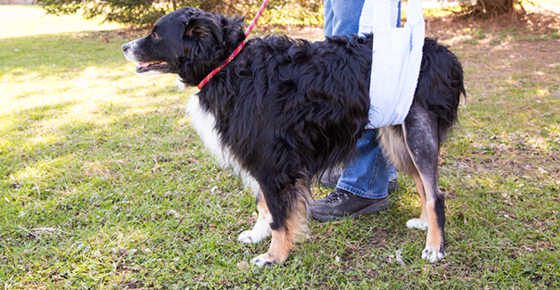
Canine hip dysplasia is the abnormal formation of the hip joint and one of the leading causes of rear leg lameness in dogs. Hip dysplasia is most prevalent in larger breed dogs, especially German Shepherds, Golden Retrievers, Labradors, Saint Bernards and Rottweilers. On the other hand, hip dysplasia is uncommon in the Doberman, Great Dane, and Greyhound. The condition can occur in small and medium sized dogs as well, for instance, the Cavalier King Charles Spaniel, Pug, and the Sussex and Clumber Spaniel. This condition affects male and female dogs equally. With hip dysplasia being a common condition in dogs, it is important that dog owners understand the symptoms, causes and treatment options.
Hip dysplasia is caused primarily by genetics, although other factors also play a role. Studies have shown that feeding a puppy too much of a high-calorie diet can cause the puppy to grow too quickly, which then increases the risk for hip problems.
The earliest symptoms can occur between four months and one year, although the signs may not be apparent until the dog is middle-aged or older. These symptoms include pain when walking, a swaying gait or limp, “bunny hopping” when running, and, most commonly, difficulty getting up due to pain in the hindquarters. Hip dysplasia is not an “all or nothing” condition, but occurs on a spectrum determined by the amount of hip dysfunction.
In a normal hip joint, the head of the femur (thigh bone) fits snugly into the socket. Dogs with mild dysplasia have a mild separation between the ball and hip socket. Dogs with moderate dysplasia will have more separation, which causes wear and tear leading to degenerative arthritis. Dogs classified as severely dysplastic have a full separation of the femur from the hip socket which leads to severe arthritis.
Diagnosing hip dysplasia requires x-rays of the hips; this almost always requires sedation or anesthesia for proper positioning. This can be done by your veterinarian. There are three methods of getting the hip x-rays: OFA, Penn-Hip, and DLS. These are just different methods of positioning and measuring. With OFA and Penn-Hip you can also send the hip films to a radiologist for an official evaluation and certification. People who want to breed their dog often do this; if you breed two dogs with good hips you are more likely to get puppies with good hips. OFA will evaluate your dog at any age, but the dog needs to be at least 24 months of age to be certified. DLS is a new system recently developed by Cornell University.
Treatment for hip dysplasia depends on the severity of the disease, the age of the dog, and what expense the owner is willing to incur. Some young dogs may be helped by a surgery called a triple pelvic osteotomy (TPO). Especially in small to medium dogs, another effective surgical option is an FHO (femoral head ostectomy) where the head of the femur is removed. On the other hand, the dog with a severely arthritic hip may be helped only by surgery to implant an artificial hip. Most cases will need pain meds, anti-inflammatory drugs, and glucosamine. Other treatment modalities are laser therapy, physical therapy, water treadmill, and acupuncture.
Source:
Baker Institute for Animal Health, Cornell University

